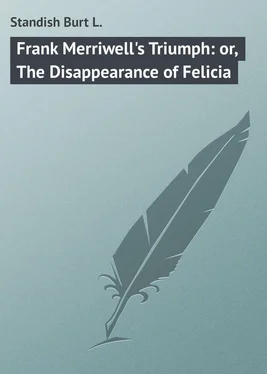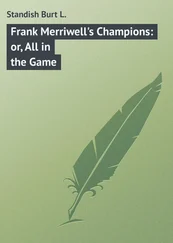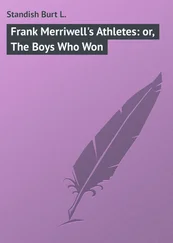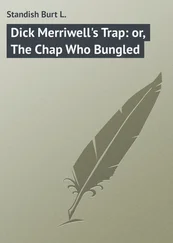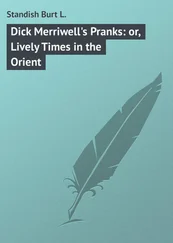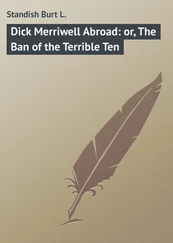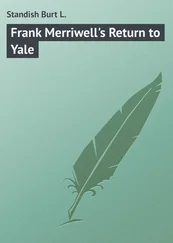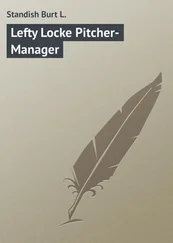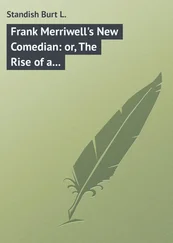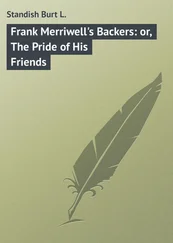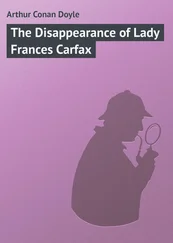Burt Standish - Frank Merriwell's Triumph - or, The Disappearance of Felicia
Здесь есть возможность читать онлайн «Burt Standish - Frank Merriwell's Triumph - or, The Disappearance of Felicia» — ознакомительный отрывок электронной книги совершенно бесплатно, а после прочтения отрывка купить полную версию. В некоторых случаях можно слушать аудио, скачать через торрент в формате fb2 и присутствует краткое содержание. Издательство: Иностранный паблик, Жанр: foreign_prose, foreign_adventure, на английском языке. Описание произведения, (предисловие) а так же отзывы посетителей доступны на портале библиотеки ЛибКат.
- Название:Frank Merriwell's Triumph: or, The Disappearance of Felicia
- Автор:
- Издательство:Иностранный паблик
- Жанр:
- Год:неизвестен
- ISBN:нет данных
- Рейтинг книги:4 / 5. Голосов: 1
-
Избранное:Добавить в избранное
- Отзывы:
-
Ваша оценка:
- 80
- 1
- 2
- 3
- 4
- 5
Frank Merriwell's Triumph: or, The Disappearance of Felicia: краткое содержание, описание и аннотация
Предлагаем к чтению аннотацию, описание, краткое содержание или предисловие (зависит от того, что написал сам автор книги «Frank Merriwell's Triumph: or, The Disappearance of Felicia»). Если вы не нашли необходимую информацию о книге — напишите в комментариях, мы постараемся отыскать её.
Frank Merriwell's Triumph: or, The Disappearance of Felicia — читать онлайн ознакомительный отрывок
Ниже представлен текст книги, разбитый по страницам. Система сохранения места последней прочитанной страницы, позволяет с удобством читать онлайн бесплатно книгу «Frank Merriwell's Triumph: or, The Disappearance of Felicia», без необходимости каждый раз заново искать на чём Вы остановились. Поставьте закладку, и сможете в любой момент перейти на страницу, на которой закончили чтение.
Интервал:
Закладка:
“A reasonable one perhaps; but if that had happened! he should be here on the watch for our return.”
“Perhaps we have returned sooner than he expected.”
“Well, what’s to be done, Merry?”
“We will sit here a while and see if he doesn’t turn up. At least, we can make some sort of a meal off this mountain goat.”
“A mighty poor meal it will be!” muttered Hodge disgustedly.
A fire was built, however, and the mountain goat served to appease their hunger somewhat, although without salt it was far from palatable. There was plenty of feed and drink for the horses, therefore the animals did not suffer. In vain they waited for Wiley to return. Afternoon faded into nightfall and the sailor came not.
“Do you propose to remain here all night, Merry?” inquired Bart.
Frank shook his head.
“I don’t think it advisable. We will find another spot.”
With the gloom of night upon them, they set out, Frank in the lead. He had taken notice of a clump of thick timber in another part of the valley, and toward this he rode. In the timber they ensconced themselves and prepared to pass the night there. Worthington was strangely silent, but seemed as docile and as harmless as a child. When all preparations to spend the night in that spot were made, Frank announced to Bart that he proposed to go in search of their missing companion.
“What can you do in the night?” questioned Hodge. “You can’t find him.”
“Perhaps not,” said Merry; “but I am going to try.”
“I hate to have you do it alone.”
“You must remain here to look out for Abe and Worthington.”
When this was settled, Merry set out on foot. During their exploration of the valley he had observed a deep, narrow fissure near the southern extremity, into which the stream plunged before disappearing into the underground channel. To him on discovering this it had seemed a possible hiding place for any one seeking to escape observation. Something caused him to set his course toward this spot.
An hour later, from a place of concealment high up on a steep bank, Frank was peering into the fissure. What he discovered there surprised and puzzled him not a little. On a little level spot close by the stream a tent had been pitched. Before the tent a small fire was burning, and squatted around this fire were three persons who seemed to be enjoying themselves in fancied security. The moment Merry’s eyes fell on two of them he recognized them as having been members of the Terrible Thirty. They were the ruffians Hank Shawmut and Kip Henry. The third person, who seemed perfectly at his ease as he reclined on the ground and puffed at a corn-cob pipe, was Cap’n Wiley!
Was Wiley a traitor? This question, which flashed through Frank’s mind, seemed answered in the affirmative by the behavior of the sailor, who was chatting on intimate terms with his new associates.
Of course Frank had decided at once that Shawmut and Henry had somehow learned of his expedition in search of Benson Clark’s lost mine and had followed him. Henry’s left hand was swathed in a blood-stained bandage, the sight of which convinced the watching youth that it was this fellow who had snatched the map and who afterward had been winged in the pursuit. In spite of appearances, Frank did not like to believe that Cap’n Wiley had played him false. From his position he was able to hear the conversation of the trio, and so he lay still and listened.
“We sartain is all right here fer ter-night,” observed Shawmut. “We will never be disturbed any afore morning.”
“Perchance you are right, mate,” said the sailor; “but in the morning we must seek the seclusion of some still more secure retreat. My late associate, the only and original Frank Merriwell, will be considerable aroused over what has happened. I am positive it will agitate his equipoise to a protracted extent. My vivid imagination pictures a look of supine astonishment on his intellectual countenance when he returns and finds his whole outfit and little Walter vanished into thin, pellucid air.”
Shawmut laughed hoarsely.
“I certain opine he was knocked silly,” he said.
“But he is a bad man,” put in Henry. “To-morrow he rakes this valley with a fine-toothed comb. And he is a heap keerless with his shooting irons. Look at this yere paw of mine. He done that, and some time I’ll settle with him.”
The fellow snarled the final words as he held up his bandaged hand.
“Yes,” nodded the sailor, “he has a way of shooting in a most obstreperous manner. The only thing that is disturbing my mental placitude is that he may take to the war path in search of my lovely scalp.”
“Confound you!” thought Frank, in great anger. “So you are a traitor, after all! Hodge was right about you. You’re due for a very unpleasant settlement with me, Cap’n Wiley.”
“What binds me to you with links of steel, mates,” said the sailor, “is the fact that you are well supplied with that necessary article of exuberancy known to the vulgar and unpoetical as tanglefoot. Seems to me it’s a long time between drinks.”
“You certain must have a big thirst,” observed Shawmut, as he produced a cold bottle and held it toward the sailor, who immediately arose and clutched it with both hands.
“Mates, it has been so long since I have looked a drink in the face that it seems like a total stranger to me. Excuse me while I absorb a small portion of mountain dew.”
His pipe was dropped, and he wiped the mouth of the bottle with his hand after drawing the cork. He then placed the bottle to his lips and turned its bottom skyward.
“So it is for that stuff you sell your friends, is it?” thought Frank.
Having remained with his eyes closed and the bottle upturned for some moments, the sailor finally lowered it and heaved a sigh of mingled satisfaction and regret.
“My only sorrow,” he said, “is that I haven’t a neck as long as a giraffe’s. If the giraffe should take to drink, what delight he would enjoy in feeling the ardent trickle down his oozle! Have something on me, boys.”
He then returned the bottle, and the ruffians drank from it.
“There,” said Wiley, picking up his pipe, “my interior anatomy glows with golden rapture. I am once more myself. Oh, booze, thou art the comforter of mankind! You cause the poor man to forget his sorrows and his misfortunes. For him you build bright castles and paint glorious pictures. For him you remove far away the cares and troubles of life. You make him a king, even while you make him still more of a pauper. You give him at first all the joys of the world and at last the delirium tremens.
“Next to women, you are the best thing and the worst thing in this whole wide world. Mates, you see I am both a poet and a philosopher. It’s no disparagement to me, for I was born that way, and I can’t help it. Ever since my joyful boyhood days on Negro Island I have looked with a loving eye on the beauties of nature and on the extracted fluid of the corn. But what of this world’s riches has my mighty intellect and my poetic soul brought me? I am still a poor man.”
“But you won’t be long arter we diskeevers this mine,” said Shawmut. “If you sticks by us, we gives you a third share.”
“Your generosity overwhelms me. But it must not be forgotten that we yet have Frank Merriwell to dispose of. It is vain for you to try to frighten him away from this valley. Last night you attempted it with your spook trick, but it didn’t work.”
“What’s that?” exclaimed Henry. “What are you talking about?”
“Oh,” said the sailor, “you can’t deceive little Walter. We heard you doing that spook turn. But it was time wasted.”
Henry and Shawmut exchanged puzzled looks.
Читать дальшеИнтервал:
Закладка:
Похожие книги на «Frank Merriwell's Triumph: or, The Disappearance of Felicia»
Представляем Вашему вниманию похожие книги на «Frank Merriwell's Triumph: or, The Disappearance of Felicia» списком для выбора. Мы отобрали схожую по названию и смыслу литературу в надежде предоставить читателям больше вариантов отыскать новые, интересные, ещё непрочитанные произведения.
Обсуждение, отзывы о книге «Frank Merriwell's Triumph: or, The Disappearance of Felicia» и просто собственные мнения читателей. Оставьте ваши комментарии, напишите, что Вы думаете о произведении, его смысле или главных героях. Укажите что конкретно понравилось, а что нет, и почему Вы так считаете.
